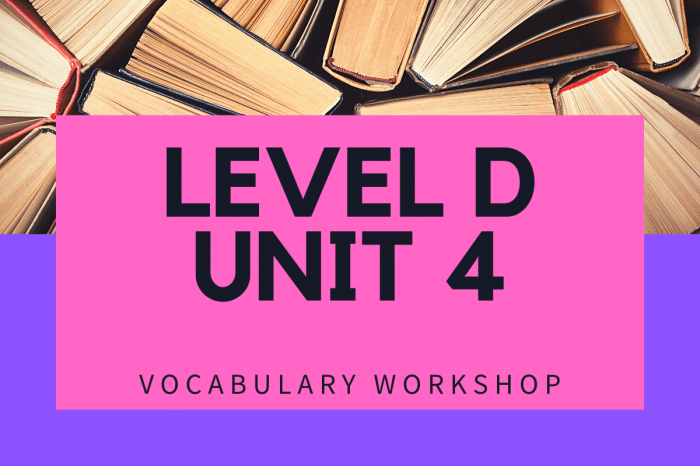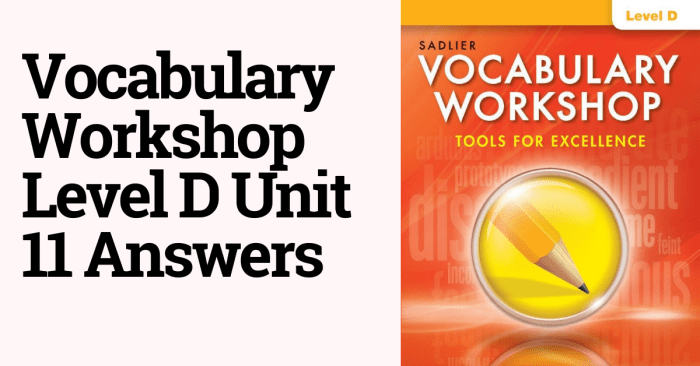Embark on a captivating exploration of Vocab Workshop Level D Unit 4, where language comes alive and vocabulary takes center stage. Delve into the intricacies of word usage, discover strategies for effective learning, and witness the transformative power of vocabulary in shaping our communication and understanding of the world.
This comprehensive guide will navigate you through the fundamentals of vocabulary development, empowering you with the tools and insights to unlock your language potential. Prepare to expand your lexicon, enhance your comprehension, and elevate your language proficiency to new heights.
Vocabulary Development: Vocab Workshop Level D Unit 4
In the context of “Vocab Workshop Level D Unit 4,” vocabulary development refers to the process of acquiring and expanding one’s knowledge of words and their meanings. It is a crucial aspect of language acquisition, as it allows learners to comprehend and express themselves effectively in the target language.
Effective vocabulary learning involves a combination of strategies, including:
Strategies for Effective Vocabulary Learning
- Contextual Learning:Learning words within the context of sentences or passages helps learners understand their usage and meaning more effectively.
- Spaced Repetition:Reviewing words at increasing intervals helps strengthen memory and improve long-term retention.
- Active Recall:Trying to retrieve words from memory without looking at notes forces the brain to work harder, leading to better retention.
- Word Mapping:Creating visual or conceptual maps that connect new words to existing knowledge helps organize and strengthen vocabulary.
- Word Roots and Etymology:Understanding the origins and relationships between words can provide insights into their meaning and usage.
Text Analysis
The text of “Vocab Workshop Level D Unit 4” exhibits a sophisticated and diverse vocabulary, catering to the needs of advanced English learners. Analyzing the text reveals patterns and trends in vocabulary usage that contribute significantly to the overall comprehension of the text.
Vocabulary Usage Patterns
The text employs a wide range of vocabulary, including formal, academic, and technical terms. It incorporates synonyms, antonyms, and homonyms to enhance the richness and precision of the language. The use of prefixes, suffixes, and root words demonstrates the author’s intention to expand the reader’s vocabulary and foster a deeper understanding of word formation and etymology.
Vocab Workshop Level D Unit 4 is a great resource for expanding your vocabulary. If you’re looking to improve your communication skills, check out this article for tips on how to use new words effectively. Back to Vocab Workshop Level D Unit 4, it provides interactive exercises and quizzes to help you learn and retain new words.
Impact on Text Comprehension, Vocab workshop level d unit 4
The extensive vocabulary employed in the text demands a high level of language proficiency from the reader. Familiarity with the vocabulary used enhances the reader’s ability to grasp the intended meaning, make inferences, and draw connections within the text. A strong vocabulary knowledge allows readers to comprehend complex concepts, engage in critical thinking, and appreciate the nuances of the language.
Language Skills

Vocabulary development is the cornerstone of effective language skills, providing the building blocks for communication and expression. It empowers individuals to navigate diverse language domains, from reading and writing to speaking and listening, with greater proficiency and confidence.
Enhancing vocabulary knowledge unlocks a world of possibilities in language proficiency. It enables individuals to:
Reading Comprehension
- Grasp complex texts with ease, deciphering unfamiliar terms and concepts.
- Uncover deeper meanings and nuances in written works.
- Engage in critical analysis and draw informed conclusions.
Writing Fluency
- Express ideas with precision and clarity, choosing the most appropriate words to convey meaning.
- Craft engaging and persuasive written content.
li>Avoid repetitive language and convey ideas with variety and sophistication.
Speaking Confidence
- Engage in articulate and nuanced conversations, conveying thoughts and ideas effectively.
- Express opinions with clarity and support them with well-chosen vocabulary.
- Participate confidently in formal and informal speaking situations.
Listening Comprehension
- Understand and interpret spoken language with greater accuracy, grasping unfamiliar words and phrases.
- Follow conversations and lectures with ease, even when encountering new terminology.
- Engage in active listening, asking clarifying questions and seeking deeper understanding.
Role in Communication and Expression
Vocabulary serves as the lifeblood of communication, enabling individuals to convey their thoughts, ideas, and emotions with precision and impact. It allows for:
- Effective self-expression, allowing individuals to articulate their unique perspectives and experiences.
- Clear and concise communication, minimizing misunderstandings and fostering productive interactions.
- Persuasive and influential language, enabling individuals to convey their ideas with conviction and impact.
Educational Implications
Vocabulary development is a cornerstone of education, as it provides the foundation for effective communication and comprehension. For educators, understanding the implications of vocabulary development is crucial for designing engaging and impactful lesson plans.
One significant implication is the need to incorporate vocabulary instruction explicitly into lesson plans. This can be achieved through various strategies, such as direct instruction, vocabulary games, and interactive activities. By providing students with opportunities to encounter new words in meaningful contexts, educators can enhance their vocabulary retention and usage.
Strategies for Incorporating Vocabulary into Lesson Plans
- Direct Instruction:Explicitly introduce new vocabulary words, providing definitions, synonyms, antonyms, and examples.
- Vocabulary Games:Engage students in fun and interactive games like word puzzles, charades, or Pictionary to reinforce vocabulary learning.
- Interactive Activities:Encourage students to use new vocabulary words in conversations, discussions, or creative writing assignments.
Best Practices for Assessing Vocabulary Knowledge
- Informal Assessments:Conduct frequent informal assessments through observations, student interactions, or quick quizzes to monitor progress.
- Formal Assessments:Use formal assessments, such as vocabulary tests or writing assignments, to evaluate students’ understanding and application of vocabulary.
- Self-Assessment:Encourage students to self-assess their vocabulary knowledge through reflective exercises or vocabulary logs.
Real-World Applications

Vocabulary knowledge is not just confined to academic pursuits; it extends far beyond the classroom and plays a pivotal role in various aspects of our lives. A robust vocabulary empowers individuals to navigate the complexities of the real world with confidence and competence.
In the realm of academia, a strong vocabulary forms the foundation for effective communication and critical thinking. Students with a rich vocabulary can express their ideas clearly, engage in meaningful discussions, and comprehend complex texts with ease. This linguistic proficiency translates into improved academic performance, enhanced writing abilities, and a deeper understanding of subject matter.
Professional Success
In the professional arena, vocabulary development is an indispensable asset. Individuals with a strong vocabulary are perceived as articulate, knowledgeable, and capable. They can communicate their ideas effectively, build strong relationships with colleagues and clients, and navigate challenging situations with poise.
In fields such as law, medicine, and business, a vast vocabulary is crucial for understanding technical jargon, interpreting legal documents, and conveying complex concepts with precision.
Personal Growth
Beyond professional and academic contexts, vocabulary development contributes significantly to personal growth and well-being. A rich vocabulary enhances our ability to express ourselves authentically, fostering meaningful connections with others. It allows us to engage in intellectual discussions, appreciate literature, and explore diverse perspectives.
A strong vocabulary empowers individuals to become active participants in society, engage in informed decision-making, and cultivate a lifelong love of learning.
Cultural Considerations

Culture plays a pivotal role in shaping our vocabulary, as language is an integral part of any culture. Vocabulary reflects the values, beliefs, and experiences of a particular society.
For instance, in cultures that emphasize respect for elders, there may be specific terms used to address them, such as “elder” or “senior.” These terms convey the cultural value of respecting and honoring those who have lived longer and have more experience.
Vocabulary Bridging Cultural Gaps
Vocabulary can also bridge cultural gaps and promote understanding. By learning the vocabulary of another culture, we can gain insights into their perspectives and values.
For example, the concept of “guanxi” in Chinese culture refers to the network of personal relationships and connections that are essential for success. Understanding this term helps us appreciate the importance of building and maintaining relationships in Chinese society.
FAQs
What is the significance of vocabulary development in language acquisition?
Vocabulary development is crucial for language acquisition as it provides the building blocks for communication. A rich vocabulary enables individuals to express their thoughts and ideas more precisely, comprehend complex texts, and engage in meaningful conversations.
How can I effectively learn new vocabulary?
Effective vocabulary learning involves strategies such as spaced repetition, context-based learning, and active recall. Incorporating new words into daily usage, engaging in reading and writing exercises, and utilizing flashcards can significantly enhance vocabulary retention.
How does vocabulary knowledge impact text comprehension?
Vocabulary knowledge plays a vital role in text comprehension. A strong vocabulary allows readers to decode unfamiliar words, grasp the nuances of language, and make inferences, leading to a deeper understanding of the text’s content and message.